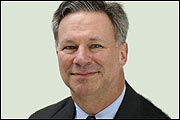UUA treasurer takes lead in socially responsible investing
Under Tim Brennan's leadership, UUA investments used to effect corporate change.
Brennan, 55, is the chief financial officer of the UUA and is responsible for all its financial affairs. He works with the board-appointed Investment Committee and the Committee on Socially Responsible Investing (CSRI). He also manages the UUA’s General Investment Fund (GIF), which includes more than $135 million in a highly diversified portfolio. About 250 congregations invest in the fund.
The treasurer also monitors the UUA’s investments to ensure they comply with socially responsible investing guidelines set by the board of trustees.
Before joining the UUA, Brennan was senior director of Ceres, a network of socially responsible investment funds, pension funds, and leading environmental organizations that collaborate to advance corporate environmental stewardship. At the UUA, his role has switched—from adviser to investor. “We push companies to improve their performance on the environment, adopt nondiscrimination policies, and pay attention to human rights issues,” he said.
Earlier this year, the UUA filed five shareholder resolutions asking major corporations to give shareholders a say in how executives are compensated. The resolution filed with Abbott Laboratories received favorable votes from 40 percent of its shareholders in June. “It was quite stunning for a first-time resolution,” said Brennan, adding that the UUA will file a resolution with Abbott again next year.
In the global warming arena, the UUA saw success in its campaign to encourage Starwood Hotels and Resorts, operator of the Sheraton and Westin hotels, to disclose its carbon dioxide emissions and its plans for addressing its climate change risk. Although Starwood had emissions policies in place, it was not disclosing them in its security filings or annual reports. “We explained that it was important for investors to have good comparable data to see which companies are doing a good job in addressing climate change risk,” Brennan said. “They said we were absolutely right and sent us a letter committing to doing everything we had asked for.”
On many of these issues, Brennan and the UUA work side by side the Interfaith Center on Corporate Responsibility, the Social Investment Forum, and other coalitions that use their investments to shape corporate policy. Using guidelines developed by CSRI, the UUA ranks companies for their consistency with UU values and screens its investments accordingly. The UUA also strategically maintains small holdings in companies whose policies conflict with its values in order to have a voice in corporate policies. For example, it owns some shares in Exxon and in Wal-Mart. “It allows us to speak to them as owners,” Brennan explained.
Although the UUA invests directly in domestic stocks for the most part, it does own a few foreign stocks. Earlier this year, on the recommendation of CSRI, the Investment Committee adopted a policy to divest shares of companies targeted by the Sudan Divestment Task Force. As a result, the UUA sold its stock in the oil-field services company Schlumberger. “We cannot ignore even indirect participation in genocide as an acceptable cost of doing business,” said UUA President William G. Sinkford in May.
The UUA has also pressured Fidelity Investments, which administers the UUA retirement plan, to divest its own holdings in companies that do business with the Sudanese government, including two Chinese oil companies, PetroChina and Sinopec. Subsequently, Fidelity did sell most of its stock in those companies. Brennan believes the sale was a direct result of pressure applied by groups like the UUA, although Fidelity denied it.
Such results make Brennan’s job immensely satisfying. “It’s a lot of fun,” he said. “Coming to the UUA is a great marriage among my religious values, my training and experience in financial management, and the work I have done in the field of socially responsible investing.”
“In less than a year, Tim has made a tremendous difference to the association,” said Kay Montgomery, executive vice president of the UUA. “He has the perfect combination of awesome intelligence, financial expertise, nonprofit savvy, and remarkable good humor.”
Along with his wife, Nancy, and their two teenage children, Brennan lives in Sharon, Mass., and attends the First Parish in Needham, UU.
He holds an M.B.A. from the Wharton School at the University of Pennsylvania and an M.A. in English from Washington University in St. Louis, where he studied the writings of Henry David Thoreau. His undergraduate English degree is from the University of Missouri at Columbia. For twenty years, Brennan worked in the business side of theater, movies, and public television.
“His background in the financial side of the theater makes our environment unintimidating to him,” Sinkford said. “That is an enormously complicated environment, and our environment is also complicated. Tim also brings a great knowledge of where the money comes from, which is a real gift. He has really stepped in and become a chief financial officer for the association.”
Brennan has found that his job also contains some surprises. At least once a month, he or his staff receives a call from a congregation sending them to the archives for documents as old as 200 years. “I will get a call from someone saying that the UUA holds a deed for their church building, and they want to borrow some money,” Brennan said. “And the endowment fund includes gifts that were made in the 19th century. We’re still tracking those trusts and using the income for designated purposes. It keeps me connected to the past and planning for the future.”
See sidebar for links to related resources.








